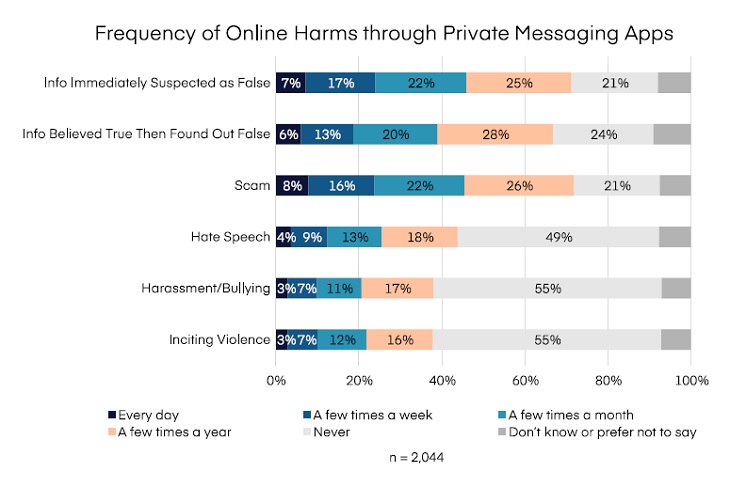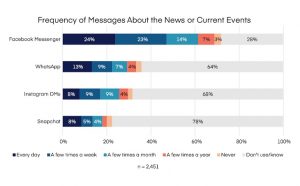
“Disinformation spreading on private messaging apps is a growing threat to our democracy”
TORONTO — With more than eight in 10 people in Canada using private messaging apps such as Facebook Messenger and WhatsApp, a new study from Ryerson University’s Cybersecure Policy Exchange finds 46% of Canadians report receiving private messages which they suspect are false at least monthly.
The report, Private Messages, Public Harms, is based on results from a representative survey of 2,500 Canadians in March 2021. The Cybersecure Policy Exchange, which is an initiative powered by RBC through Rogers Cybersecure Catalyst and the Ryerson Leadership Lab, analyzed the role of private messaging in Canada, including user exposure to disinformation, hate speech and spam.
Some of the other findings from the report include:
- 39% of survey respondents report receiving private messages they initially believe to be true, but later find out are false, at least monthly;
- 21% said they rely on private messages for news, up from 11% in 2019;
- Those who believe in Covid-19 conspiracy theories are significantly more likely to regularly receive news through WhatsApp and Facebook Messenger;
- A majority of survey respondents have about the same level of trust in news they receive through messaging apps as they do in news from websites, TV or social media; and
- 26% receive messages containing hate speech at least monthly, with rates higher among people of colour.
“To date, Canadian regulatory proposals to regulate big tech have focused on social media content that remains publicly accessible, but disinformation spreading on private messaging apps is a growing threat to our democracy. The federal government should join other international jurisdictions in regulating greater transparency into how online private messaging apps can manifest in public harms,” said Sam Andrey, director of policy and research at the Ryerson Leadership Lab, in a press release.
The Cybersecure Policy Exchange makes the following recommendations for the federal government to mitigate potential harms:
- Require transparency from large online platforms to better understand online harms through private messaging;
- Invest in research and innovation specific to disinformation and other online harms on private messaging platforms in Canada; and
- Make investments in policy-informed digital literacy efforts that build resilience to disinformation through private messaging platforms.
For more, please click here.




